Fake COINBASE Token Checker
Verify a Token Contract
Verification Results
When you see a new token promising sky‑high returns and using the word “Coinbase” in its name, pause and ask: Fake COINBASE token - is it legit or a trap?
Fake COINBASE (COIN) token is a fraudulent cryptocurrency that impersonates the well‑known exchange Coinbase. It does not exist as an official product, nor does the company ever issue its own exchange token. The scam copies Coinbase’s branding, uses the real stock ticker “COIN”, and then sells a worthless ERC‑20 token on decentralized exchanges.
Why Scammers Use the Coinbase Brand
Coinbase is a household name in crypto investing. Its stock has traded on Nasdaq under the ticker COIN since April2021, giving the name instant credibility. By appending “[Fake]” or simply calling the token “COINBASE”, fraudsters piggy‑back on that trust.
Typical Claims Made by the Fake Token
- “Guaranteed 300‑500% returns in 30 days.”
- “Backed by Coinbase’s technology and team.”
- “Limited supply - only 270million tokens.”
- “Listed on CoinMarketCap with a market cap of billions.”
None of these statements hold up under scrutiny.
Red Flags That Prove It’s a Scam
- Fake listings on public trackers. The token appears on two separate CoinMarketCap pages (UCID36756 and UCID36965) with contradictory supply numbers and a price listed at $0 or $6.43 - both impossible for a brand‑new token.
- No contract activity. The contract address
0x0adc…d7dd2eshows zero legitimate transactions on Etherscan as of October2023. No wallet ever transferred the token. - Impossible market data. Listings claim a 100% circulating supply while simultaneously reporting 0 tokens in circulation, and they display an “all‑time high” dated August222025 - a future date.
- No development or community. Real projects have public code repositories (e.g., Bitcoin with >62000 commits). The fake token has zero GitHub commits, no whitepaper, and no active social channels.
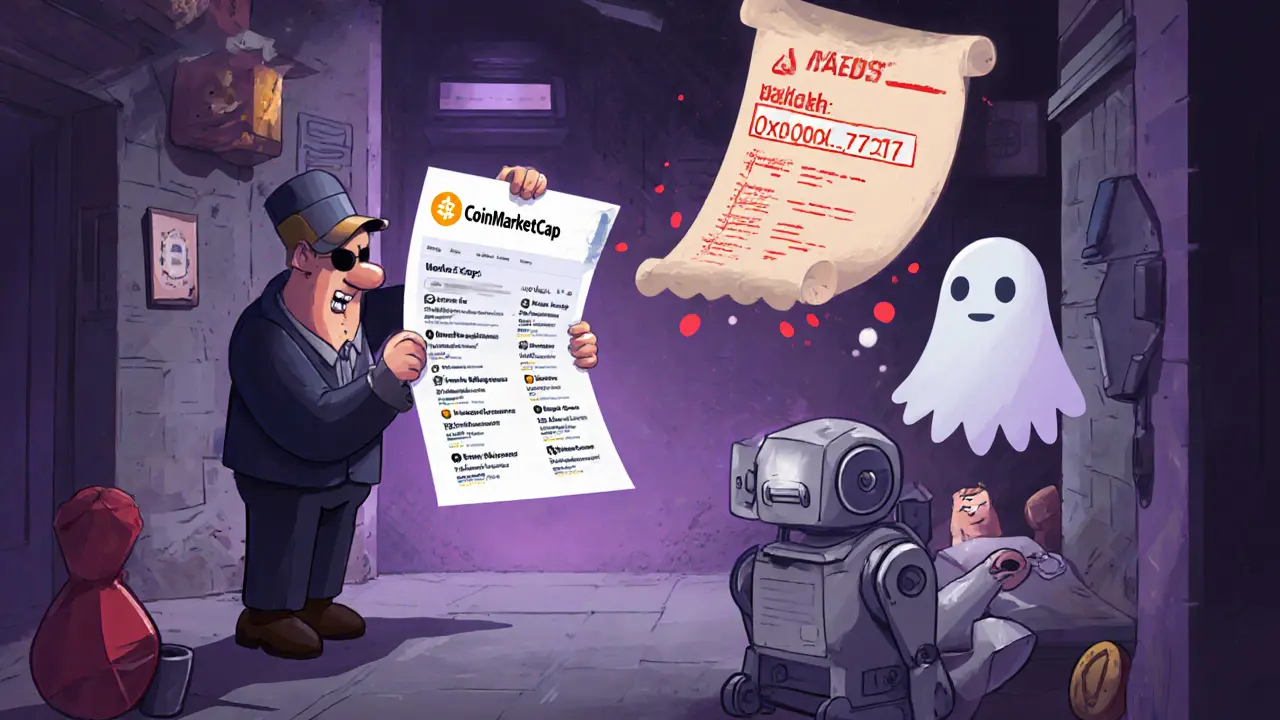
How the Scam Operates
Forensic firms like Chainalysis have mapped a repeatable lifecycle:
- Create a mock CoinMarketCap page (average cost $350 on the dark web).
- Use wash‑trading bots to inflate volume and price.
- Promote the token on social media and Reddit’s r/CryptoScams.
- Liquidity is drained from the PancakeSwap pool within 24‑48hours, leaving buyers with a dead token.
The average scam duration is 26.7hours, and victims lose about $2,150 each, according to the Massachusetts Attorney General’s Office.
Official Warnings and Enforcement
Multiple agencies have sounded the alarm:
- The Federal Trade Commission recorded 46,000 crypto impersonation complaints in Q12023, with Coinbase being the most duplicated brand.
- Coinbase’s security team issued alert COIN‑SEC‑2023‑08, flagging 287 impersonation scams using fake COIN tickers.
- The Commodity Futures Trading Commission listed 43 active FakeCOINBASE variants in its September2023 enforcement report.
Side‑by‑Side: Fake Token vs Real Coinbase Stock
| Attribute | Fake COINBASE (COIN) token | Coinbase Global, Inc. (COIN) stock |
|---|---|---|
| Issuer | Anonymous scammers | Coinbase Global, Inc. |
| Market venue | Decentralized exchanges (e.g., PancakeSwap) | Nasdaq exchange |
| Regulation | None - unregistered token | SEC‑registered public company |
| Transparency | No code, no audits, zero on‑chain activity | Quarterly reports, audited financials |
| Liquidity | Often removed within 48hours | High daily volume, market makers |
| Typical price claim | “$6.43” with $2billion market cap (fake) | Real market price (e.g., $85 as of Oct2025) |
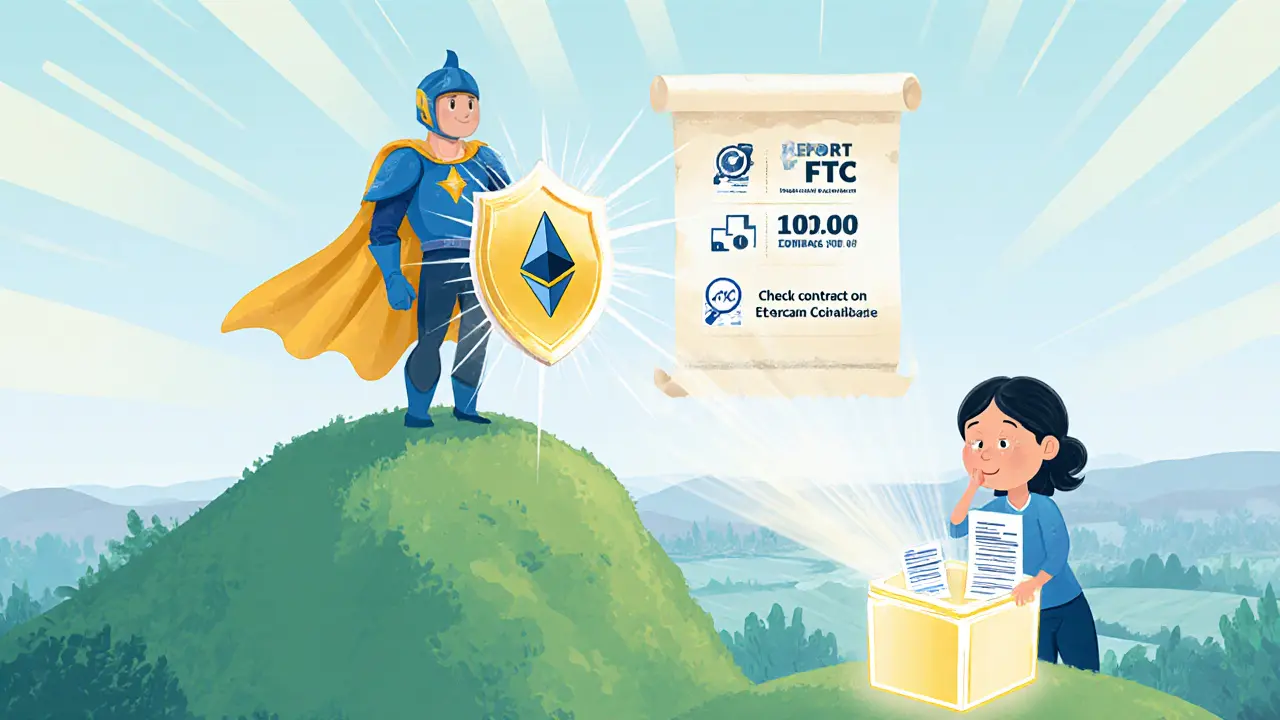
Impact on Victims
Victim stories are consistent. On Reddit, user CryptoLearner2023 posted that they lost $3,200 after the token’s liquidity vanished 12minutes after purchase. Trustpilot’s 142 reviews for “Coinbase Coin” average 1.2/5 stars, with 94% labeling it a scam.
Recovery rates are grim: Chainalysis reports only 4.2% of funds are ever recovered, and when they are, it takes an average of 11.3months.
How to Protect Yourself
- Never trust a token that claims to be issued by a major exchange unless the exchange explicitly announces it.
- Check the token’s contract on Etherscan - look for transaction history and verified source code.
- Avoid buying tokens listed only on CoinMarketCap with zero trading volume on reputable DEXes.
- Read official security alerts from Coinbase, the FTC, and your local regulator.
- If approached by “support” agents offering to recover your funds for a fee, treat it as another phishing attempt.
What to Do If You’ve Already Bought the Token
- Document every transaction - screenshots, wallet addresses, dates.
- Report the incident to your local consumer protection agency (e.g., the Massachusetts Attorney General’s Office handles many crypto fraud cases).
- File a complaint with the Federal Trade Commission - they track impersonation scams.
- Consider reaching out to a blockchain forensics firm; while recovery odds are low, they can help trace the exit wallet.
Frequently Asked Questions
Is there an official Coinbase token called COIN?
No. Coinbase is an exchange and a publicly traded company on Nasdaq with the ticker COIN. It has never issued an ERC‑20 or any other cryptocurrency token.
How can I verify if a token is real?
Start with the contract address on Etherscan. Look for verified source code, a history of transactions, and links to an official website or GitHub repo. If the token only appears on CoinMarketCap with no on‑chain activity, it’s likely fake.
What should I do if I’m scammed?
Gather all evidence, report to the FTC and your local consumer‑protection agency, and consider a forensic analysis service. Do not pay anyone promising to “recover” your money - that’s another scam.
Why do scammers target Coinbase’s brand?
Coinbase is trusted by millions of investors, so its name instantly lends credibility. Impersonating it tricks people into lowering their guard and sending money quickly.
Can I trade the real COIN stock on crypto exchanges?
No. COIN is a stock traded on Nasdaq. Some crypto‑focused broker platforms let you buy fractional shares, but there is never a token version of the stock.
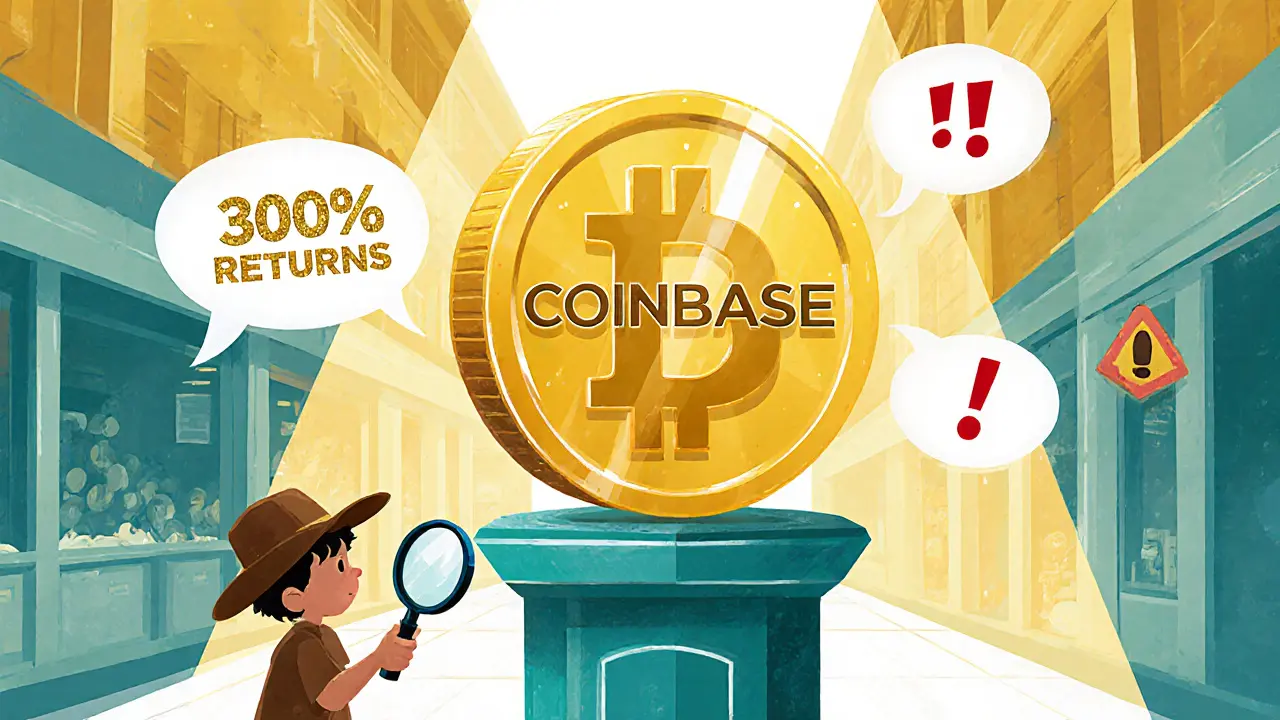
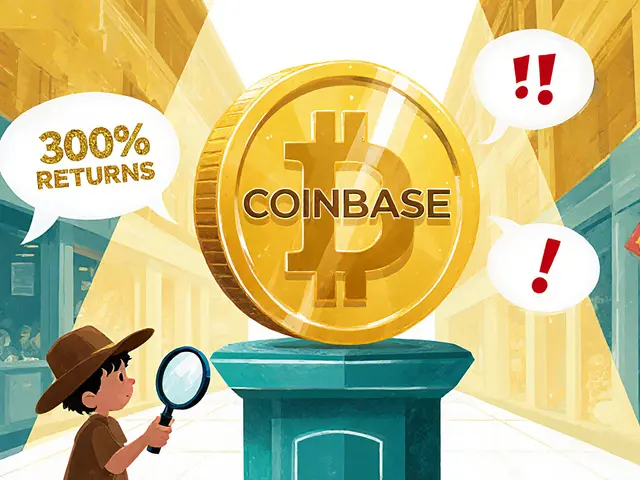
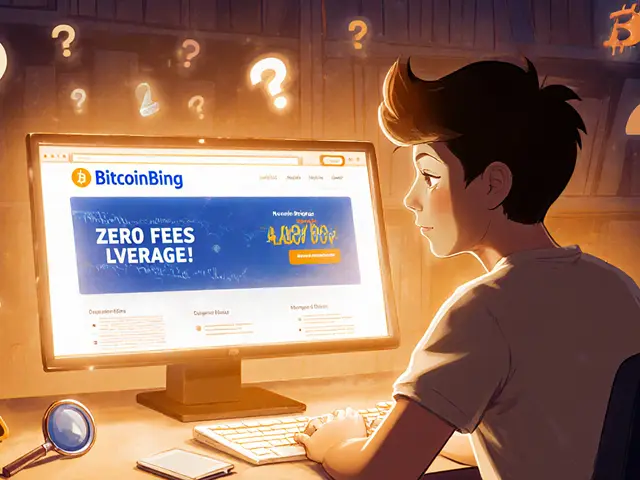



Richard Williams
October 10, 2025 AT 13:14Just saw this and had to share - I lost $1,800 to a fake COINBASE token last year. Thought it was legit because it had the Coinbase logo and even said 'official partner' in the Discord. Never again. Always check Etherscan first. Seriously, if there’s zero transaction history, run.
Prabhleen Bhatti
October 10, 2025 AT 22:05OMG, this is SO important!! I mean, like, seriously - how many people are still falling for this?!! The fact that they use the COIN ticker?? That’s not just lazy, that’s *maliciously* clever!! And the future date on the all-time high?? 2025?? That’s not even a typo - that’s a *signature* of a scam!! I’m literally shaking!!
Also, did you know that in India, these scams are exploding because people think if it has “Coinbase” in the name, it’s like a government-backed crypto?? No!! It’s like putting a Tesla logo on a bicycle and selling it as an electric car!!
And the worst part? The “recovery agents” who DM you after you get scammed?? They’re the same people who created the token!! It’s a two-layer scam!! Like, a Russian nesting doll of fraud!!
Pls, everyone - if you’re new to crypto, just stick to exchanges you can spell. Coinbase, Binance, Kraken - if it’s not on those, and it’s not on your bank’s app, it’s a trap!!
Also, I just reported the contract to Chainalysis - if you’re reading this and got scammed, DO NOT PAY ANYONE TO RECOVER IT!! They’ll take your money too!!
Elizabeth Mitchell
October 11, 2025 AT 20:52Yeah, I saw this token pop up on my feed too. Thought it was weird, but didn’t dig deeper. Now I’m glad I didn’t click. Honestly, if a token has ‘Coinbase’ in the name and no official announcement, it’s already dead.
Chris Houser
October 12, 2025 AT 01:21Bro, this is why we need more crypto education in places like Nigeria. People see ‘Coinbase’ and think ‘safe’. But they don’t know what Etherscan is, or what a contract address does. I’ve had friends lose rent money to this exact scam. We need to make simple guides - like, ‘If it’s not on Coinbase.com, it’s not real’.
William Burns
October 13, 2025 AT 01:11One must question the intellectual integrity of individuals who conflate a publicly traded equity with a non-fungible, unregulated, decentralized token. The conflation of COIN (Nasdaq-listed security) with COINBASE (a fraudulent ERC-20 artifact) is not merely a misstep - it is a symptomatic failure of financial literacy in the digital age.
Moreover, the proliferation of such scams underscores the abdication of regulatory oversight by bodies such as the CFTC and FTC, who have permitted the commodification of deception under the guise of innovation. One cannot help but observe that the very platforms that profit from crypto speculation - exchanges, influencers, and social media algorithms - are complicit in the normalization of such fraud.
It is not enough to warn users. We must dismantle the infrastructure that enables it.
Ashley Cecil
October 13, 2025 AT 02:47It is profoundly disturbing that such blatant fraud continues to thrive in the absence of meaningful legal consequences. The fact that scammers can create counterfeit CoinMarketCap listings with impunity - and that victims are left with no recourse - is a moral and systemic failure. The FTC’s 46,000 complaints in Q1 2023 should have triggered immediate legislative action, not a press release.
Furthermore, the use of “Coinbase” as a brand proxy is not merely deceptive - it constitutes trademark infringement on a massive scale. Why has Coinbase not pursued civil litigation against these contract addresses? The silence is complicity.
John E Owren
October 13, 2025 AT 08:44I’ve seen this exact scam three times now. Every time, the same fake market cap, same fake future date, same zero-transaction contract. It’s like they copy-paste the same template from a scam forum. I don’t even click on these anymore - I just screenshot and report. If you’re new, just remember: if it sounds too good to be true, and it has the word ‘Coinbase’ in it - it’s a trap.
Joseph Eckelkamp
October 14, 2025 AT 03:54Oh wow, another ‘COINBASE’ token? How original. Let me guess - the whitepaper is just a screenshot of Coinbase’s homepage with ‘AI-powered blockchain synergy’ pasted on top? And the Telegram group has 12,000 members, all bots, with one real person asking ‘is this real?’ and getting 17 replies saying ‘yes bro, 500% in 24hrs’?
It’s like watching someone try to sell a fake Rolex made of plastic at a flea market… but in crypto form. And the kicker? They’re not even trying to be clever anymore. The ‘future date’ on the chart? That’s not a glitch - that’s the scammer’s signature. Like a serial killer leaving a calling card.
Meanwhile, Coinbase quietly updates their security page, and we all pretend we’re not living in a post-truth economy where trust is the most valuable currency - and the most easily stolen.
Jennifer Rosada
October 14, 2025 AT 12:32It’s not just about the money - it’s about the emotional toll. People lose their life savings, their retirement funds, their trust in technology. And then they’re told, ‘it’s crypto, you knew the risks.’ No. You didn’t know the risks. You were tricked by a logo. That’s not risk - that’s theft. And we need to stop normalizing it.
Every time someone says ‘they should’ve done their research,’ they’re blaming the victim. The scammers are the ones who designed the deception. The system that lets them do it is broken.
adam pop
October 14, 2025 AT 13:42Wait… what if this is all a psyop? What if Coinbase themselves created these fake tokens to make people scared of crypto so they can push their own centralized products? I mean, think about it - they’re the only ones who benefit from people thinking crypto is a scam. Maybe the real scam is the whole narrative.
And why is the FTC so obsessed with Coinbase? Are they being paid off? The timing is too convenient. They shut down 287 scams… right after Coinbase launched their new wallet? Coincidence? I think not.
Dimitri Breiner
October 15, 2025 AT 02:16This is why I always tell newbies: if you don’t know how to check a contract on Etherscan, don’t touch it. Period. I’ve saved friends from losing tens of thousands because I just told them to Google the contract address. If it’s got zero transactions and no code, it’s garbage. No exceptions.
And if you’re reading this and you’ve been scammed - don’t give up. Report it. Even if nothing happens, you’re helping build the case. We need more data to pressure regulators.
LeAnn Dolly-Powell
October 15, 2025 AT 06:58So sad to see this happen again 😔 I just hope anyone reading this takes it seriously. Crypto can be amazing, but only if you’re careful. Please, please, please - if you’re not sure, wait. Ask someone. Don’t rush. You’ll thank yourself later. 💙
Anastasia Alamanou
October 16, 2025 AT 03:53One thing I’ve learned from mentoring new crypto users: most people don’t understand the difference between a stock and a token. That’s not their fault - the industry doesn’t explain it. We need better onboarding. Not just ‘don’t click this,’ but ‘here’s how to read a contract, here’s why Etherscan matters, here’s how to spot a fake listing.’
This scam works because it exploits ignorance, not greed. Fix the education gap, and you fix the scam.
Rohit Sreenath
October 16, 2025 AT 05:43People are fools. They see a big name and think it’s safe. They don’t think. They just click. This is why the world is falling apart. No wisdom. Only greed. And now they cry when they lose. Too late. You were warned.
Sam Kessler
October 16, 2025 AT 22:43Let’s be real - this isn’t about ‘scams.’ It’s about the collapse of institutional trust. The fact that a random address with zero code can impersonate a Nasdaq-listed company and fool thousands speaks volumes. We’ve outsourced truth to algorithms and marketing. The ‘Coinbase’ token isn’t a scam - it’s a symptom.
And the real scam? The belief that blockchain will save us from human corruption. It won’t. It just makes it faster.
Steve Roberts
October 17, 2025 AT 18:44Actually, I think the real scam is how Coinbase does nothing to stop this. They make billions off crypto trading - why don’t they buy up the domain names? Why don’t they legally challenge these contracts? They’re letting the brand get ruined so they can sell more of their own products. This whole thing is a distraction.
Richard Williams
October 18, 2025 AT 08:11^ This is exactly why I’m calling Coinbase out. They have the resources to flag these scams on CoinMarketCap - they just don’t. I’ve DM’d their security team twice. Silence. Meanwhile, people are losing homes. That’s not negligence - that’s profit-driven apathy.